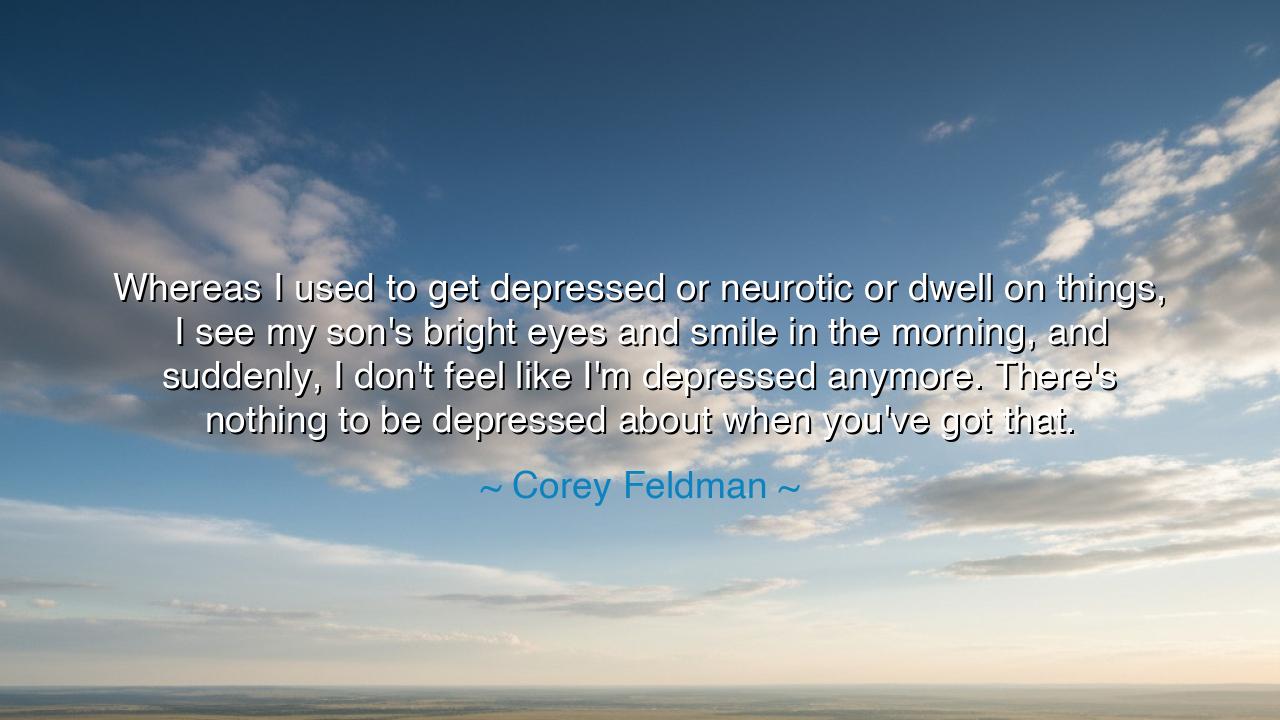
Whereas I used to get depressed or neurotic or dwell on things, I
Whereas I used to get depressed or neurotic or dwell on things, I see my son's bright eyes and smile in the morning, and suddenly, I don't feel like I'm depressed anymore. There's nothing to be depressed about when you've got that.






In the words of Corey Feldman, we are presented with a truth both tender and profound: “Whereas I used to get depressed or neurotic or dwell on things, I see my son's bright eyes and smile in the morning, and suddenly, I don't feel like I'm depressed anymore. There's nothing to be depressed about when you've got that.” At its core, this saying reminds us of the healing power of love, the ability of a simple smile and the innocent joy of a child to banish the shadows of despair that linger in the hearts of adults. The ancients would say: when darkness overwhelms the spirit, light does not always come from distant stars, but from the gaze of those we love most.
The meaning of this teaching rests on the shift of perspective. Feldman admits that in the past he was prone to sorrow, caught in cycles of depression and worry. Yet the moment he sees his child’s bright eyes and smile, the weight falls away. This is the eternal wisdom: that when we look beyond ourselves, when we anchor our lives not in inward torment but in outward love, despair loses its grip. The ancients likened this to the rising of the sun—how swiftly night is driven back when dawn appears, no matter how long and deep the darkness seemed.
We can see reflections of this truth in history. Consider the tale of Marcus Aurelius, the Roman emperor and Stoic philosopher, who often faced immense pressure and sorrow amidst war, betrayal, and personal loss. Yet he found solace in the simple joys of his children, writing in his Meditations of how their presence reminded him of the beauty of existence and the need to live virtuously. Just as Feldman looked into his son’s eyes, Aurelius looked into the face of family and saw a reason to endure. This is the eternal bond between love and the banishment of despair.
The origin of this wisdom lies not only in Feldman’s personal journey but in the timeless human truth that connection overcomes isolation. Depression thrives in the chambers of solitude, feeding on thoughts that spiral inward. But the smile of a child, innocent and uncorrupted, breaks through that prison. It offers a mirror of hope, a reminder that life is not merely a burden but a gift meant to be shared. Ancient teachers would say: “He who looks upon the laughter of the young touches the face of eternity.”
Let us remember also the story of Winston Churchill, who battled with what he called his “black dog” of depression. Yet in moments of play with his children and painting in their company, he often found relief, even joy. For when the mind grows heavy, the heart must find anchors in the simplest, most innocent treasures of life. Feldman’s experience is thus not singular but part of a universal pattern that transcends time, binding emperors, warriors, artists, and parents alike.
The lesson for us, then, is this: when despair rises, seek not grand victories or riches, but the purest smiles, the brightest eyes, and the living bonds around you. One cannot always silence the voice of sadness, but one can turn to the light of loved ones and find strength. If you have no child of your own, you can still find this joy in kin, in friends, in service to others, for joy multiplies when it is shared. Love is the ancient medicine of the soul.
Practical wisdom teaches us to begin each morning with gratitude, to look upon those we love before the shadows creep in. To remember, in the rhythm of daily life, that each smile given or received is a shield against despair. And when we falter, let us recall Feldman’s words: there is truly nothing to be depressed about when life places before us the miracle of another’s light.
Thus, my children, guard these words as a jewel. For though sorrow will knock upon the doors of every life, it cannot abide long in the presence of bright eyes and a morning smile. Let your gaze fall often upon the innocent and the joyful, and you will find the courage to walk on, unburdened, into the day.






AAdministratorAdministrator
Welcome, honored guests. Please leave a comment, we will respond soon